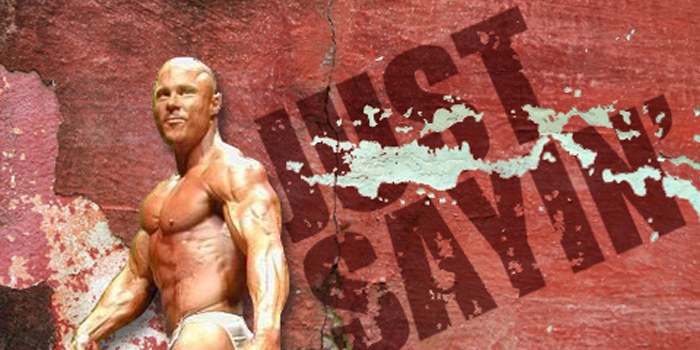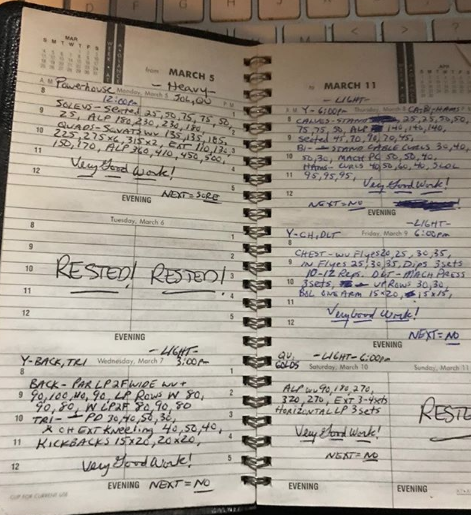
Someone told me the other day that I don’t live the bodybuilding lifestyle. My first response was to laugh and ask if they were serious or if it was some kind of joke. He was serious. I didn’t really know how to respond after that because it seemed absurd to make such a statement to someone who has been in involved in the industry for so long, trained for over 30 years, and competed for over 20 years. I am still competing, even though admittedly it is less frequent than it was 10 or 20 years ago.
After the exchange with this person, I couldn’t get it out of my head for the rest of the day. I just couldn’t get where he was coming from and why a statement like that would ever be made to me. Was it resentment or bitterness for some reason? Was it jealousy, possibly? I figure young kids (kids in their early to mid-20s are “young kids” to guys like myself) just don’t like me after I have bashed them openly for many years about a number of things: inexperience, immaturity, irresponsibility, etc. You know, basically just like you and I at that same age.
RECENT: The Great Fructose Debate
It took me a couple of days of really digging into my psyche and being honest with myself when I figured out (I think) what he meant. First, we must define what it means to live a bodybuilding lifestyle. My definition would be the following points. Understand that the list could be quite long, so I have shortened it so as to be as concise with my point as possible:
1. Making Your Training a Top Priority
Training needs to be done on a scheduled and consistent basis. If you are determined to reach your goals, you make the sacrifices that are needed to get your training in and for it to be optimized as much as possible. This could include traveling further to a gym that is better equipped than the one closest to you or putting your workout ahead of “free-time” activities that don’t help you to step closer to your goals.
2. Making Your Diet a Top Priority
A bodybuilding diet comes before eating pizza or having drinks with your friends, and it comes before having the best burger in town when you just “feel like a burger.” A big part of success in this sport is due to diligent and consistent tracking of your nutrition — arguably just as much as training, if not more so. A big component of structured dieting is not only setting up your nutritional plan but also preparing food ahead of time so that unforeseen situations don’t sidetrack your diet.
3. Spending Time Researching and Learning Your Trade or Craft
Learning is one of the most important components of living the bodybuilding lifestyle, because even if you are highly structured and consistent, your progress will be incredibly limited if you aren’t making the correct decisions in the gym or in the kitchen. Obviously, you also need to learn your body and what you, specifically, respond to best. Other areas of learning include understanding hormones, digestion, responses to training stimuli, function of muscles and the CNS, etc. The list is long — probably endless.
4. Giving Priority to Things That Build Your Goals and Avoiding Things That Detract
There are many things that I have enjoyed doing over the years, but if they present an obstacle to my progress or a potential risk of injury, I usually take that into consideration when deciding whether to undertake a hobby or activity. An example would be baseball. I would have loved to continue to play baseball when I was younger, but the risk to my shoulder and elbow was something that I wasn’t willing to take. I wouldn’t go out these days and play a pick-up game of basketball for fear I would blow out a knee with lateral movements on the court that I am not accustomed to. Yes, I still take risks like riding my motorcycle, but a life with no risk is a pretty boring life, in my opinion.
5. A Financial Investment
If you truly want to be successful with your bodybuilding journey, you have to expect to spend money. This would include (but is not limited to) supplements, training gear, gym memberships, high-quality food, and possibly even spending money to learn from someone who is considered an expert in all things diet and training related.
I do all of these things still today, and I did not pick these five factors simply because I do them. Not only do I do them, but I do them to what most people would think are extreme levels. I have too many examples over the last 34 years but I will give you a few.
I passed on playing baseball in Japan as a teenager for 14 days over seven cities because I was going to miss workouts. Dumb? In hindsight, of course, it was. At the time, my training took priority over playing baseball. I passed on a senior trip to the Bahamas for the same reason. Fast forward to more recent times and I make it a point to take my food with me when I go out with friends or family instead of eating at a restaurant and hoping they have something I can “make work” for my diet. I do this even when I am not prepping because my diet is a top priority.
So, after reviewing all of the above, I think I would qualify as living the bodybuilding lifestyle. However, let’s go back to the definition of living a bodybuilding lifestyle that I touched on earlier. The statement was made to me by a 22-year-old. Now, I always like to preface my bashing of “young kids” by saying that I completely agree that not all young kids are dumb, don’t have it figured out, or are immature and stupid (just most of them). That being said, his definition clearly differed from mine.
I will not give priority to the 10,131st workout of my life to miss one of my kids’ games, nor will I miss that same workout for a school function, an anniversary (I have been married for 25 years), or because my dad is in town for a few days to help me build a deck on my house. I will avoid spending time on a weekend at a bodybuilding show unless I have a client or friend in it, in favor of spending time with my family and friends. Keep in mind that I have probably been going to shows before this kid (who made the statement to me) was even a fertilized egg. It doesn’t mean that I don’t like bodybuilding; what it means is that I don’t like going to a show more than I like spending time doing things that are far more fun. You go to shows for 34 years and let’s see if you still think they carry the same zing that they did when you first started going.
READ: Married to a Bodybuilder: Three Women Share Their Support Role Perspectives
I prefer not to talk about bodybuilding when I am not working. I have discussed everything bodybuilding-related for a very long time and I do it for most of my day and have done so for almost every single day of my life for the last 20 years that I have worked in the industry (and probably even longer than that when I was a teen, smitten with the sport). There isn’t much left to talk about other than listening to someone go on and on about themselves, how much they bench, the two chicken breasts and rice they ate for their last meal, and how much they weigh.
You might be asking yourself why his comment bothered me so much. I was asking myself the same question. My best guess is because being questioned by someone who has seen and done a fraction of what you have done dents the ego a bit. I admit it. It was also said by someone without any other real responsibility in life outside of getting to his college classes on time (that his parents pay for), training, and pulling some ass as often as possible. He doesn’t have kids, a wife, a mortgage, a business or career, etc. Basically, real life hasn’t yet begun. Living the bodybuilding lifestyle so intensely that it consumes you is incredibly easy to do when you don’t have other obstacles or stressors in your life.
My answer to myself was this: Our definitions differ due to our age and our world experiences. Not many people would question whether I live the bodybuilding lifestyle and whether I am still passionate about the sport. I live it, breathe it, and have for a very long time. I am being judged for my ability to focus on all things bodybuilding 100% and still know when there is time not to. My meals are timed, but between meals, I do not think about eating or bodybuilding. My training is highly structured, regimented, and consistent. However, before and after my training session, I don’t give any thought to training. I also give up a workout when someone else's time, like my kids' or my wife's, is more important than my own. It doesn’t happen often but it does happen.
This isn’t a lack of living the bodybuilding lifestyle. This is the ability after years of doing this that I am able to compartmentalize bodybuilding and this allows me to do other things that aren’t at all related to bodybuilding. From a naïve 22-year old “young kid,” this appears to lack passion, discipline, and is not as highly structured as he feels it should be. Talk to me when you give the sport over 30 years. If you are still doing it (and doing it at a level that a lot of people don’t or can’t at that age) we can talk. Your opinion will then carry more weight. Just Sayin’.













You are living the adult professional lifestyle. Further, you have an excellent grasp of "work - life" balance.
'Nuff said.